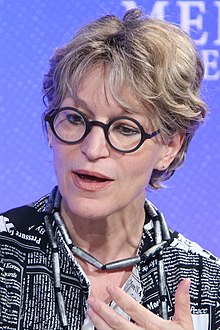Agnès Callamard
Agnès Callamard | |
|---|---|
 Callamard in 2019 | |
| Education | Institut d'Etudes Politiques de Grenoble Howard University New School for Social Research |
| Occupation(s) | Human rights activist and scholar |
| Years active | 1995-present |
| Employer | Office of the United Nations High Commissioner for Human Rights (OHCHR) |
Agnès Callamard is a French Human Rights expert and the Special Rapporteur on extrajudicial, summary or arbitrary executions appointed by the United Nations Human Rights Council.[1] She is also the Director of Columbia University's Global Freedom of Expression project.[2]
Early life and education
In 1985, Callamard received her undergraduate degree from the Institut d'Etudes Politiques de Grenoble. In 1995, she received a PhD in Political Science from the New School for Social Research in New York.
Career

Callamard is considered an expert on a number of international and UN human rights initiatives and has conducted human rights investigations in a number of countries in Africa, Asia, and the Middle East.[3] She has published in the field of human rights, women's rights, refugee movements and accountability. Callamard has worked extensively in the field of international refugee movements with the Center for Refugee Studies in Toronto.
In May 2017, Callamard attended a conference in the Philippines, which led to her Wikipedia page being vandalized.[3][4] Callamard stated that the visit was not in an official capacity.[5]
Amnesty International
From 1998 to 2001, Callamard served as Chef de Cabinet for the Secretary General of Amnesty International, and as the organisation's Research Policy Coordinator, she led Amnesty's work on women's human rights. Callamard has conducted human rights investigations in a large number of countries in Africa, Asia, and the Middle East.
HAP International
In 2001, Callamard worked and led HAP International (the Humanitarian Accountability Partnership, created in 2003) where she oversaw field trials in Afghanistan, Cambodia and Sierra Leone and created the first international self-regulatory body for humanitarian agencies committed to strengthening accountability to disaster-affected populations. She was in this position until 2004.
Article 19
From 2004 to 2013, Callamard served as Executive Director of Article 19, a human rights organization.
Columbia University
As of November 2013, Callamard is Director of Columbia University's Global Freedom of Expression initiative.
United Nations
Callamard is the United Nations Special Rapporteur on extrajudicial, summary or arbitrary executions, appointed by the Human Rights Council resolution A/HRC/RES/35/15 of 22 June 2017 for a 3 years mandate.[6] In 2019 she led the human rights inquiry into the assassination of Saudi journalist Jamal Khashoggi. Her findings were presented to the UN Human Rights Council in June 2019.[7]
She concluded that the drone strike on Iranian General Qasem Soleimani was unlawful as part of advance version of her report on "Report of the Special Rapporteur on extrajudicial, summary or arbitrary executions" for the Forty-fourth session of the Human Rights Council.[8]
Works and publications
- Callamard, Agnès (18 March 2009). "Protect the believers, not the belief". The Guardian.
- Callamard, Agnès; Amnesty International Dutch Section; Codesria (2000). Monitoring and Investigating Torture, Cruel, Inhuman or Degrading Treatment, and Prison Conditions (PDF). Dakar: Council for the Development of Social Science Research in Africa. ISBN 978-2-869-78088-0. OCLC 47863459.
- Callamard, Agnès (12 August 2015). "Comity for Internet? Recent Court Decisions on the Right to be De-indexed". The National Law Review.
- Callamard, Agnès (23 March 2017). "Are courts re-inventing Internet regulation?". International Review of Law, Computers & Technology: 1–17. doi:10.1080/13600869.2017.1304603.

References
- ^ "Dr. Agnes Callamard, Special Rapporteur on extrajudicial, summary or arbitrary executions". Office of the United Nations High Commissioner for Human Rights (OHCHR).
- ^ "People: Agnès S. Callamard". Global Freedom of Expression Project, Columbia University. Archived from the original on 2018-12-23. Retrieved 2017-05-05.
- ^ a b Vibar, Ivy Jean (5 May 2017). "UN rapporteur's Wikipedia page defaced upon visit to PH". ABS-CBN News.
- ^ Cabato, Regine (5 May 2017). "Malacañang slams visit of UN rapporteur to PH". CNN Philippines.
- ^ Callamard, Agnes (5 May 2017). "Special Rapporteur rejects misinformation about her current academic visit to Philippines". Office of the United Nations High Commissioner for Human Rights (OHCHR).
- ^ Vukovic, Brenda (18 August 2016). "UN experts urge the Philippines to stop unlawful killings of people suspected of drug-related offences" (Press release). Office of the United Nations High Commissioner for Human Rights (OHCHR).
- ^ "The Crown Prince of Saudi Arabia". pbs.org. Retrieved 1 October 2019.
- ^ "Qasem Soleimani: US strike on Iran general was unlawful, UN expert says". BBC. 9 July 2020. Retrieved 11 July 2020.
